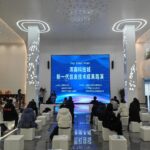Shenzhen News August 30, 2025 Shenzhen is a youthful city with an average age of only 32.5, but it will also face the test of the “silver tsunami.” On August 29, the “Members’ Forum” hosted by the Municipal Political Consultative Conference and undertaken by the Shenzhen Committee of the Chinese Peasants’ and Workers’ Democratic Party focused on “Cultivating a Field of Happiness for the Elderly in a Young City,” jointly exploring the path of coexistence and prosperity between Shenzhen’s “youth” and “silver hair.” The Chairperson of the Municipal Political Consultative Conference attended the event.
From day care centers to senior canteens, from smart pillboxes to age-friendly modifications… at the forum, members praised Shenzhen’s elderly care services, believing that the city has basically formed a “15-minute elderly care service circle,” with technology and financial empowerment laying a solid foundation for quality elderly care in Shenzhen. However, Shenzhen’s elderly care also faces issues such as insufficient supply of affordable elderly care beds, long waiting times, high costs at private elderly care institutions, mismatched supply and demand for elderly care services, a shortage of professional caregiving talent, and “low-end homogenization” of elderly care service products. How to solve these problems? Members offered suggestions.
A member of the Guangming District Political Consultative Conference, Standing Committee Member of the Shenzhen Committee of the Chinese Peasants’ and Workers’ Democratic Party, and Deputy Director of the Guangming District Civil Affairs Bureau, stated that resources should revolve around the elderly, transforming neighborhood elderly care stations into “micro hubs for elderly care,” and integrating related public services such as healthcare and elderly care into a “livelihood map” mini-program for real-time checking and one-click appointments. At the same time, a “silver talent database” could be established to recruit retired teachers, lawyers, judges, and cultural and sports enthusiasts to participate in community governance and social enterprise services, allowing them to contribute their skills and achieve value re-creation for the elderly.
A Standing Committee Member of the Municipal Political Consultative Conference, Vice Chairperson of the Shenzhen Committee of the Chinese Peasants’ and Workers’ Democratic Party, and Second-Level Researcher at the Bao’an District Bureau of Industry and Information Technology, suggested building a platform similar to a “silver version of Meituan,” through which the elderly can schedule daily care services such as assistance with bathing, meal support, and accompanying medical visits, making access to elderly care services more convenient.
How to break the “low-end homogenization” of elderly care service products? A Member of the Shenzhen Economic Work Committee of the Chinese Peasants’ and Workers’ Democratic Party and General Manager of Shenzhen As Technology Co., Ltd., proposed providing loan support, tax support, and rental support to R&D-focused elderly care enterprises, enabling them to invest more funds in research and development to offer diverse, personalized, and customized elderly care service products.
“We must continuously improve and refine the ‘Shenzhen Standard’ for home and community elderly care services, making Shenzhen a benchmark in the national elderly care field,” said a Member of the Municipal Political Consultative Conference, Vice Chairperson of the Shenzhen Committee of the Chinese Peasants’ and Workers’ Democratic Party, and Second-Level Senior Director of the Futian Supervision Bureau of the Municipal Market Supervision Administration.
The Secretary-General of the Municipal Political Consultative Conference attended the event.
Shenzhen
Shenzhen is a major city in Guangdong Province, China, that transformed from a small fishing village into a global technology hub following its designation as China’s first Special Economic Zone in 1980. This rapid development was a cornerstone of the country’s economic reforms, making it a symbol of modern China’s explosive growth. Today, it is famously home to numerous tech giants and innovative startups.
Municipal Political Consultative Conference
The Municipal Political Consultative Conference (MPCC) is a local advisory body in Chinese cities that serves as a key part of the country’s political consultation system. It brings together representatives from various political parties and social sectors to provide suggestions and oversight on local government policies. The institution is modeled after the national Chinese People’s Political Consultative Conference (CPPCC), which was established in 1949.
Chinese Peasants’ and Workers’ Democratic Party
The Chinese Peasants’ and Workers’ Democratic Party is one of the eight legally recognized minor political parties in the People’s Republic of China that follows the leadership of the Communist Party of China. It was founded in 1930 and historically represented intellectuals in the fields of medicine, health, and science and technology. The party’s primary role in the modern Chinese political system is to offer advice and support to the governing Communist Party.
Guangming District Political Consultative Conference
The Guangming District Political Consultative Conference is a local advisory body in the Guangming District of Shenzhen, China. It serves as a platform for multi-party cooperation and political consultation under the leadership of the Communist Party of China, offering suggestions on local governance. Its history is tied to the modern administrative development of the district as part of Shenzhen’s growth as a special economic zone.
Guangming District Civil Affairs Bureau
The Guangming District Civil Affairs Bureau is a local government agency in Shenzhen, China, responsible for administering civil affairs for its district. It handles matters such as marriage registration, social welfare, and community services for residents. As a modern administrative body, its history is tied to the development and urbanization of the Shenzhen Special Economic Zone from the late 20th century onward.
Bao’an District Bureau of Industry and Information Technology
The Bao’an District Bureau of Industry and Information Technology is a local government administrative body in Shenzhen, China. It was established to implement national industrial policies and oversee the technological modernization and economic development of the district, which has a rich history as a former county and a key part of the Shenzhen Special Economic Zone. Its primary functions include regulating local industries, promoting information technology integration, and fostering innovation.
Shenzhen Economic Work Committee
The Shenzhen Economic Work Committee was a key administrative body established in the early 1980s to oversee and implement the economic reforms in the Shenzhen Special Economic Zone (SEZ), China’s first SEZ. It played a pivotal role in transitioning the area from a small fishing village into a global hub for manufacturing and innovation by facilitating foreign investment and piloting market-oriented policies. The committee’s work was foundational to the “Shenzhen Speed” of development and its eventual success as a model for China’s economic transformation.
Futian Supervision Bureau
The Futian Supervision Bureau is a historical government office in Shenzhen, China, originally established during the Ming Dynasty to oversee local administration and tax collection. It now operates as a museum that preserves and showcases the history of ancient Chinese imperial supervision systems.


